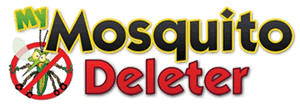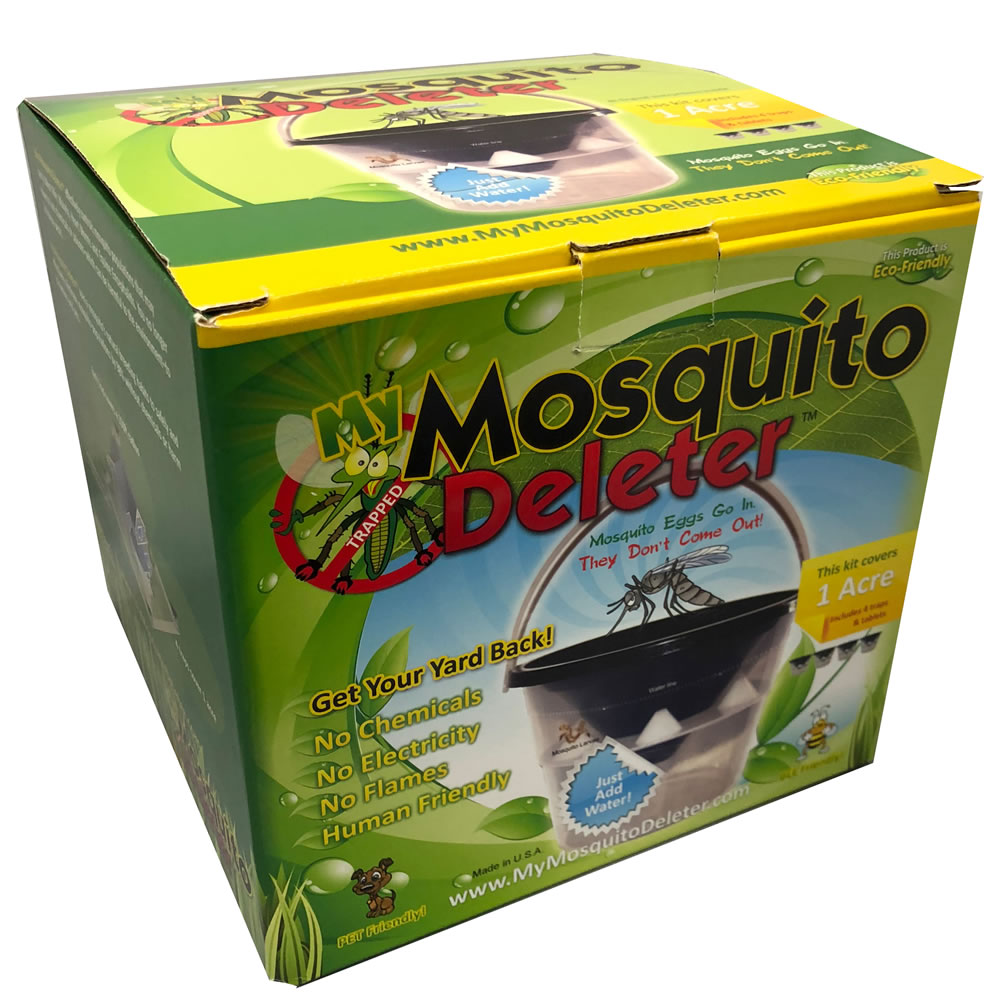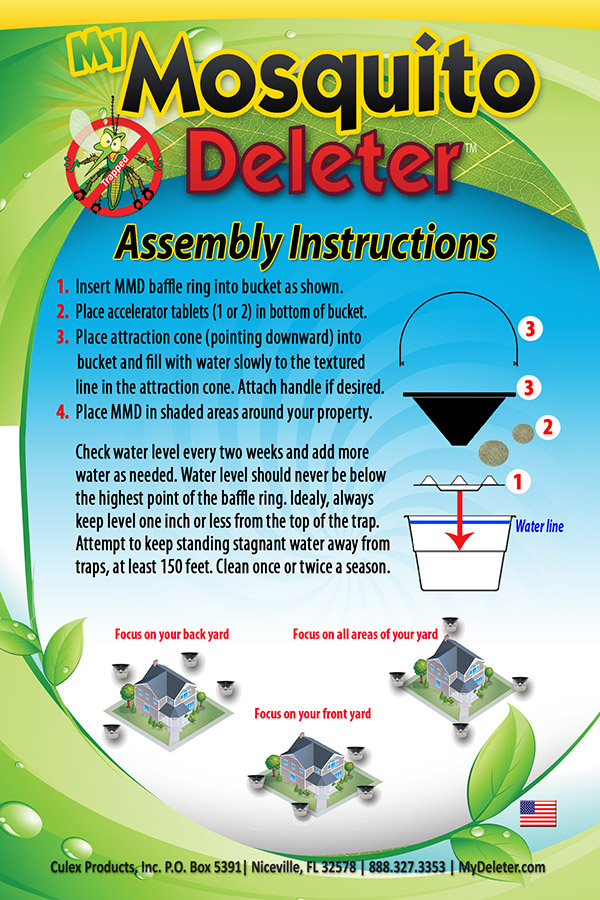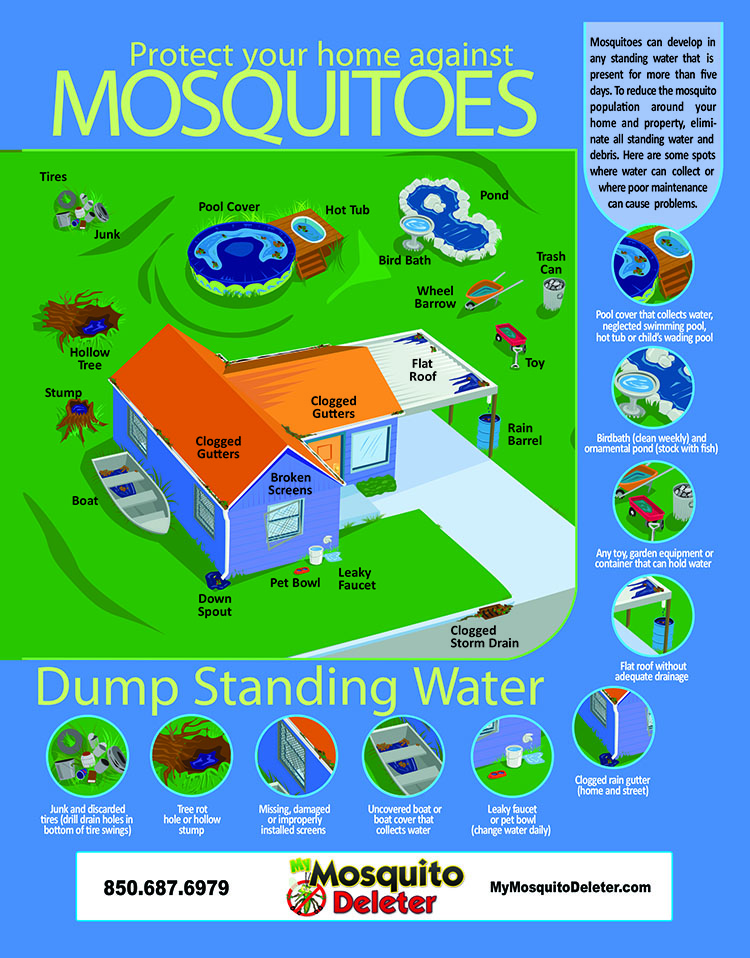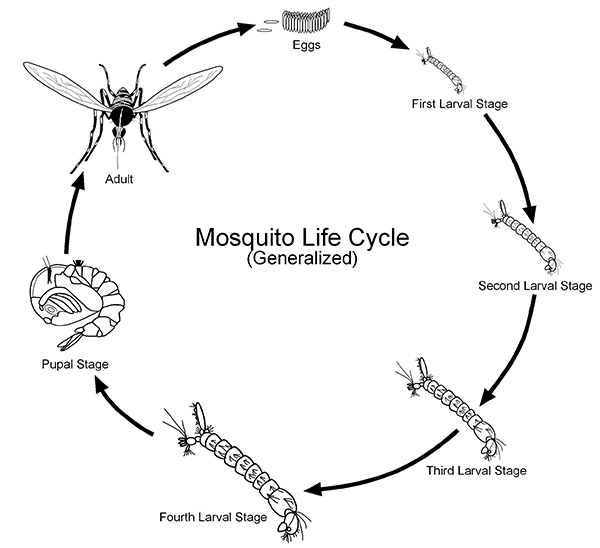What You Should Know About Mosquitoes
Twenty Facts About Mosquitoes
- Only female mosquitoes bite. Both male and female feed mainly on fruit and plant nectar, but the female also needs the protein in blood to help her eggs develop. Once she’s had her fill of blood, she’ll rest for a couple of days before laying her eggs.
- There are more than 3,500 species of mosquitoes. About 175 of them are found in the United States, with the Anopheles quadrimaculatus, Culex pipiens,Aedes aegypti and Aedes albopictus (Asian tiger mosquito) among the most common. The Anopheles is a malaria carrier, and the other three are known to spread various forms of encephalitis.
- West Virginia has the fewest species of mosquitoes. There are 26 in the mountainous state, while Texas has the most with 85. Florida is a close second with 80 identified species.
- Mosquito is Spanish for “little fly.” The word reportedly originated in the early 16th century. In Africa, New Zealand and Australia, mosquitoes are often called “Mozzies”
- Mosquitoes don’t have teeth. The females “bite” with a long, pointed mouthpart called a proboscis. They use the serrated proboscis to pierce the skin and locate a capillary, then draw blood through one of two tubes.
- A mosquito can drink up to three times its weight in blood. Don’t worry, though. It would take about 1.2 million bites to drain all the blood from your body.
- Female mosquitoes can lay up to 300 eggs at a time. Usually, the eggs are deposited in clusters – called rafts – on the surface of stagnant water, or they are laid in areas that flood regularly. Eggs can hatch in as little as an inch of standing water. Females will lay eggs up to four times before they die.
- Mosquitoes spend their first 10 days in water. Water is necessary for the eggs to hatch into larvae, called wigglers. Wigglers feed on organic matter in stagnant water and breathe oxygen from the surface. They develop into pupae, which do not feed and are partially encased in cocoons. Over several days, the pupae change into adult mosquitoes.
- Mosquitoes hibernate. They are cold-blooded and prefer temperatures over 80 degrees. At temperatures less than 50 degrees, they shut down for the winter. The adult females of some species find holes where they wait for warmer weather, while others lay their eggs in freezing water and die. The eggs keep until the temperatures rise, and they can hatch.
- The average mosquito lifespan is less than two months. Males have the shortest lives, usually 10 days or less, and females can live about four to eight weeks, under ideal conditions. Females of species that hibernate may live up to six months.
- Mosquitoes can’t fly very far or very fast. Most mosquitoes can fly no more than about one to three miles, and often stay within several hundred feet of where they were hatched. However, a few salt marsh species can travel up to 40 miles. The top speed for a mosquito is about 1.5 miles per hour.
- Mosquitoes have been around since the Jurassic period. That makes them about 210 million years old. They’ve been mentioned throughout history, including in the works of Aristotle around 300 B.C. and in writings by Sidonius Apollinaris in 467 B.C.
- The bumps from mosquito bites are caused by saliva. While one tube in the proboscis draws blood, a second pumps in saliva containing a mild painkiller and an anti-coagulant. Most people have minor allergic reactions to the saliva, causing the area around the bite to swell and itch.
- Malaria is caused by a parasite that lives in mosquitoes. The parasite gets into mosquito saliva and is passed on when the insect bites someone. West Nile and other viruses are passed the same way. Mosquitoes can also carry and pass on canine heartworm.
- West Nile virus came to the U.S. in 1999. Scientists first identified it in a feverish woman in Uganda – the West Nile district – in 1937. There were large outbreaks of the virus reported in Israel, South Africa, and Romania up through the late ’90s. The virus first appeared in the United States in 1999 with an epidemic in New York.
- Mosquitoes do not transmit HIV. The virus that causes AIDS does not replicate in mosquitoes and is actually digested in their stomachs, so it’s broken down without being passed on.
- Mosquitoes are considered the deadliest “animal” in the world. The Anopheles mosquito, in particular, is dangerous because it transmits malaria, which kills more than one million people every year, primarily in Africa. Alexander the Great is believed to have died of malaria in 323 B.C.
- Insecticides work, but only in the short term. Permethrin, one of the most common chemicals used by local mosquito control programs, kills mosquitoes on contact by disrupting their central nervous systems. However, eggs and larvae often are not affected. Once the insecticide dissipates, mosquitoes can return.
- Mosquito traps can kill thousands of mosquitoes in a single night. One study conducted by public health researchers in Australia found that a Mega-Catch™ trap caught and killed more than 44,000 female mosquitoes from 17 species in less than two weeks.
- Bug zappers are useless against mosquitoes. Studies have shown that less than 1 percent of the insects killed by zappers are mosquitoes or other biting insects. The devices attract and kill beneficial or harmless insects, like moths, and have no effect on the overall mosquito population. Electronic repellents have also proven ineffective in scientific testing.
Sources: The American Mosquito Control Association; the U.S. Centers for Disease Control; the U.S. Department of Agriculture; and, entomology and agriculture departments at the University of California – Davis, Colorado State University, Rutgers University, University of Nebraska, and the University of Florida.
Yard Maintenance is a Must!
As described above, all mosquitoes require standing water t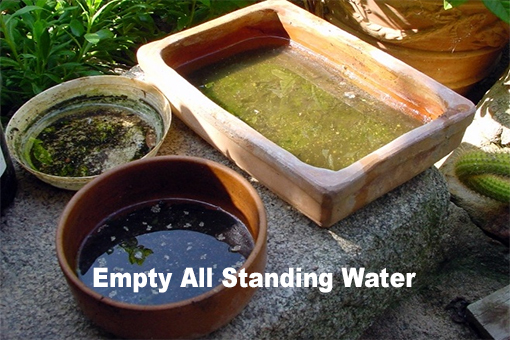 o breed, and most mosquitoes do not fly far from the location where they were bred to feed. Therefore, one of the best ways to reduce the number of mosquitoes in your yard is to implement a regular (weekly) program to dispose of accumulated water. You need more than a mosquito repellent for yard.
o breed, and most mosquitoes do not fly far from the location where they were bred to feed. Therefore, one of the best ways to reduce the number of mosquitoes in your yard is to implement a regular (weekly) program to dispose of accumulated water. You need more than a mosquito repellent for yard.
The most common prevention tips to reduce mosquito breeding sites are to turn over, throw away, or drill holes in the bottom of any container in your yard capable of holding water (garbage and recycling containers, for example); dump out bird baths or flush weekly with fresh water; empty potted plant saucers, outdoor pet bowls, and any children’s toys that may accumulate water regularly; and make sure rain gutters are free from clogging debris so that rain drains properly.
Order Online
Order your My Mosquito Deleter online.
Go to Products
Need Help?
Fund Raising
Help control Mosquitoes while helping your organization raise needed funds. Make up to 50% profit.
Learn more about our “Fund Raising” opportunities.
